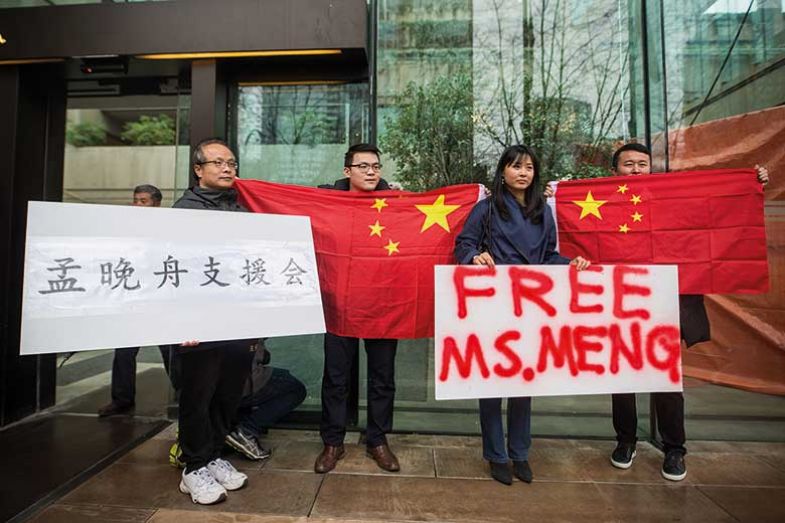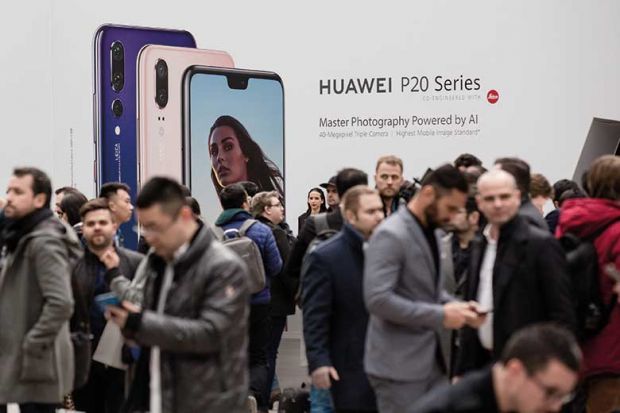With Huawei set to spend $20 billion (£15.7 billion) a year on research and development globally, the Chinese technology giant is now a growing presence in university research.
The Shenzhen-based company, which sold more smartphones than Apple in 2018 (about 200 million, behind only Samsung), has partnered with some 300 universities worldwide on more than 1,200 projects. Its Huawei Innovation Research Programme funds dozens of scholarships and research projects each year, inviting researchers to apply for grants of up to $70,000.
In the UK, the Chinese company has worked with more than 20 universities on more than 100 projects over the past five years. In November 2017, Huawei agreed to invest £25 million with BT in a new research base at the University of Cambridge – its largest investment in a UK higher education institution – and it has also funded a £5 million project at the University of Surrey into developing the 5G mobile communications network.
Elsewhere, Huawei has substantial links with universities in Hong Kong, Singapore and mainland China, and it spent a “modest” $10 million on research at US universities in 2017, according to a Financial Times editorial by its chairman, Eric Xu, in July 2018.
But in recent months Huawei has also found itself the subject of sustained debate about its links to the Beijing government, with a number of Western governments raising concerns about using Chinese-designed technology and communications platforms. This includes the UK, where the defence secretary, Gavin Williamson, has voiced “deep concerns” about Huawei’s involvement in updating the UK’s mobile communications network to superfast 5G, echoing similar concerns in the US, Australia and New Zealand.
The spotlight on the company intensified last month when its chief financial officer, Meng Wanzhou – the daughter of founder Ren Zhengfei – was arrested in Canada, where she remains pending an extradition request by the US on suspicion of breaching American sanctions on Iran. The company has denied any wrongdoing and has also denied that it is controlled by the Chinese state.
So should this period of intense scrutiny prompt universities to review their collaborations with the company? Or should higher education institutions stand above the political fray and, in this case, any influence that might be being brought to bear by Washington’s trade war with China?
“The Huawei issue has become so politicised that it is hard to seek truth from facts any more,” said Frank Pieke, director of the Mercator Institute for Chinese Studies in Berlin, who added that “bashing Huawei has become a favourite way of retaliating against allegedly unfair Chinese trade practices”.
The problem that universities have is that while Western intelligence agencies might mistrust its technology, “nobody I have spoken to can or wants to give any concrete evidence or facts of why that should be so”, he said.
The result is that Huawei is left in the unenviable position that “unless they can demonstrate that they are indeed safe from Chinese government interference they remain, I am afraid, guilty until proven innocent”.
But what is the official line on Huawei? While the UK’s prime minister, Theresa May, has blocked Chinese involvement in the Hinkley Point nuclear power plant, she was happy to meet Huawei executives in Beijing in February 2018 when the company said that it would invest £3 billion in the UK over the next five years.
Last week, the University of Oxford’s chancellor, Lord Patten of Barnes, told the House of Commons Foreign Affairs Committee that “it would be very helpful if there was more agreement within government about what is acceptable” in terms of research cooperation with Chinese firms. He urged the government to establish a “point of contact within government for universities” that can advise institutions.
On Huawei, Lord Patten added that “if the government has anxieties about a company, it should be possible for a university, if it is being offered a research collaboration, to talk to someone in government”.
Many of the concerns about Huawei apply to Chinese technology companies more generally. Researchers have highlighted the importance of the Beijing government’s vision of “military-civil fusion”, under which the People’s Liberation Army should draw on civilian innovations to push forward its modernisation.
But should universities feel compelled to accede to ministerial advice on working with Huawei or not, even if such counsel were readily available?
“Whether we end up in a new Cold War with China or not is not something universities should take the lead on,” said Steve Tsang, director of the SOAS China Institute.
“If the West eventually ends up in a new Cold War with China, universities will have to adjust, but that should be left to governments to decide and universities to follow, not the other way round.”
While governments may have good reason to be sensitive about who controls their communications infrastructure, this is not a reason to stop research collaboration, said Professor Tsang.
“Pushing boundaries in technology is one of the things we do in universities, and we should continue to do so, largely regardless of politics,” he said.
Of course, universities should know “where they may need to draw a line” and should refuse to work with companies developing technology “that is used only to abuse human rights”, explained Professor Tsang.
But relatively few companies would ever fall into that bracket, he said. “Most technologies are not so specific and are in a sense ‘neutral’,” he said, adding that “5G, for example, can be used for advancing freedom [just as easily] as it can be used to restrict it”. For these “grey area technologies”, universities should continue working with Chinese partners, he believed.
“What universities must make clear is that we must and will uphold a high standard in research ethics, which includes making sure the innovations and inventions we develop are not used to abuse human rights,” said Professor Tsang.
“This should not be a Huawei-specific policy, but a general one,” he added – perhaps flagging how innovations linked to US tech giants Google and Facebook have also faced criticism in recent times, notably over how personal data are shared to influence political elections.

International incident: the arrest in Canada of Huawei’s CFO, Meng Wanzhou, intensified concerns about the company’s reach
Huawei, for its part, emphasises the mutual benefits that flow from its university partnerships for academics and the company, which is a sponsor of Times Higher Education’s World Academic Summit series. Michael Hill-King, Huawei UK’s collaboration director, described the firm as “one of the biggest funders of ICT research in the UK”.
“We only have 80,000 of our own R&D staff, and the important word in that sentence is ‘only’ – [on our own] we cannot hope to keep up with all the new research directions or trends that are constantly emerging,” he said. To keep on top of developments, Huawei had decided to “work with UK universities, which have some of the best academics on the planet”, said Mr Hill-King.
In addition to Huawei’s substantial funding of university research, its involvement was important to furthering the quality of outputs, argued Mr Hill-King, who previously held senior technology transfer roles at Imperial College London and King’s College London.
“We provide different types of funding, but also ask different questions, suggest different approaches and provide new intellectual challenges,” said Mr Hill-King, who added that the opportunity for academics to apply their research in an industrial setting was “hugely motivating”.
David Sampson, vice-provost (research and innovation) at Surrey, agreed, saying that collaboration with Huawei had helped to make the university’s 5G Innovation Centre “one of the world’s leading experimental test beds for 5G technologies”. The partnership would “allow our academics and our commercial partners to test the possibilities of this powerful new technology before it becomes an operational part of the national infrastructure”, said Professor Sampson, who explained that the centre was “exploring applications from simply faster communications to new applications that could revolutionise human health and future transport”.
On cybersecurity, Huawei argues that concerns around this issue should be addressed at a global level and that companies should not be treated differently based on their country of origin, asserting that it has earned the trust of partners around the world, including, in Europe, every major telecoms provider.
In any case, some IT experts believe that the UK and other countries have little choice about who to work with in this field, either in research or on communications infrastructure, because Huawei is so far ahead of the pack. The company currently holds about 10 per cent of all patents essential to 5G, so attempting to match its technology is just not feasible, one UK cybersecurity expert told THE.
Banning the company would severely hamper UK infrastructure development, while the cost and time involved in developing more trusted home-grown technology in effect ruled it out, the expert said. Although the UK might talk up the potential threat of Huawei, it “would ultimately have to accept the risk” of using its products, he concluded.
But Alex Joske, a researcher at the Australian Strategic Policy Institute’s International Cyber Policy Centre, argued that universities should not ignore the ethical implications of working with Huawei.
He highlighted concerns over Huawei’s role in providing technology and support to China’s Public Security Bureau in the Xinjiang autonomous region, where as many as 1 million ethnic Uighurs are being held in “re-education camps”.
“Huawei appears to use the region as a site for developing new surveillance and social management technologies,” said Mr Joske. He argued that these activities could not be wholly divorced from Huawei’s collaborations with Western academics.
“Much of Huawei’s collaboration with universities focuses on technologies relating to big data, smart cities and artificial intelligence, precisely the kinds of technologies being applied in China’s digital totalitarianism,” he added.
Even Huawei’s expanding role as a provider of university infrastructure, such as wi-fi networks, could be problematic if it rendered institutions as “potential intelligence targets” for Chinese surveillance keen to access sensitive research findings, Mr Joske continued.
“By developing close relationships with Huawei, universities may open themselves to greater security risks and jeopardise their relationship with their own government over these security concerns,” he said.
POSTSCRIPT:
Print headline: Huawei scrutiny puts university ties in the spotlight
Register to continue
Why register?
- Registration is free and only takes a moment
- Once registered, you can read 3 articles a month
- Sign up for our newsletter
Subscribe
Or subscribe for unlimited access to:
- Unlimited access to news, views, insights & reviews
- Digital editions
- Digital access to THE’s university and college rankings analysis
Already registered or a current subscriber? Login








